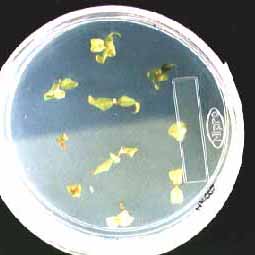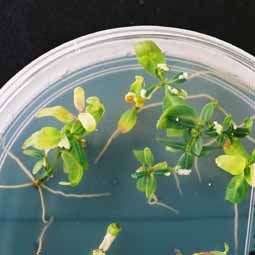 Non altered eucalyptus |
 Genetically altered, salt-tolerant eucalyptus |
March 8, 2002
Nippon Paper Industries Successfully Develops Genetically Engineered Salt-Tolerant Eucalyptus
Nippon Paper Industries Successfully Develops Genetically Engineered Salt-Tolerant Eucalyptus
- Opening possibilities in the prevention of desert expansion by planting salt-resistant eucalyptus -
Nippon Paper Industries Co., Ltd.
Tokyo, March 8, 2002 - Nippon Paper Industries Co., Ltd., Japan's leading paper and pulp manufacturing firm and a member of the Nippon Unipac Holding Group, today announced that it has succeeded in developing highly salt-tolerant eucalyptus plants through the application of its proprietary genetic engineering technology, the Multi-Auto-Transformation (MAT) Vector System. The company's internal tests have shown that the genetically altered eucalyptus grew in environments that contained salt at a sodium chloride (NaCl) concentration as high as 200 mM, which is equivalent to one-third of the NaCl concentration of seawater.
The gene introduced into the eucalyptus in this experiment is called the codA gene, named from choline oxidase of the soil bacterium Arthrobacter globiformis. Choline oxidase catalyzes the oxidation of choline and promotes the conversion of choline to glycine betaine (betaine), a kind of amino acid in plants that works to protect cells from salt stress. It is known that such salt-tolerant plants as "Akaza" (Chenopodium album L. var. centrorubrum) and barley accumulate substantial amounts of betaine in their cells to balance their cellular solute concentrations. The choline oxidase gene from Arthrobacter globiformis, the codA, has been identified by Professor Norio Murata and his colleagues at the National Institute for Basic Biology in Aichi, Japan. Their past research results describe enhanced salt resistance in the flowering plant "Shiroinunazuna" (Arabidopsis thaliana) and in rice plants transformed by the codA gene.
To introduce the codA gene into eucalyptus, researchers at Nippon Paper Industries applied the MAT Vector System, an innovative gene transformation technology developed by Nippon Paper Industries in 1995. The proprietary technology allows the introduction of a number of genes and multiple transformations without the use of antibiotic or herbicide resistance genes as selectable marker genes.* This ground-breaking technique also has the capability to remove the marker genes from the transgenic plants. Consequently, it is deemed a safer and more environmentally friendly method of gene alteration.
The genetically engineered, salt-tolerant eucalyptus presents a possible new solution for the global problem of soil deterioration. The modified tree may help to meet the environmental challenges raised by dramatically expanding deserts and salt-containing barrens in many parts of the world. The altered eucalyptus has not only shown a high tolerance to salt but has exhibited a tendency to resist other environmental stresses, such as excessive heat and very low temperatures. Nippon Paper Industries plans to continue its research on eucalyptus's characteristics with regard to environmental stress and to conduct evaluative tests on safety issues in gene alteration. The company hopes that this basic research in biotechnology will contribute to the development of plants and trees for afforestation in deteriorated areas, as well as for papermaking materials.
*Selectable markers are genes that allow the transformed cells that express them to be selected against nontransformed cells. While antibiotic or herbicide resistance genes are widely used as selective markers, the MAT vector uses ipt genes (catalysis for cytokinin synthesis) in combination with removable elements, which leave no selectable marker genes in the host plants.
Eucalyptus shoots under a test environment with NaCl concentrations of 200 mM
(one-third of normal seawater NaCl concentrations)